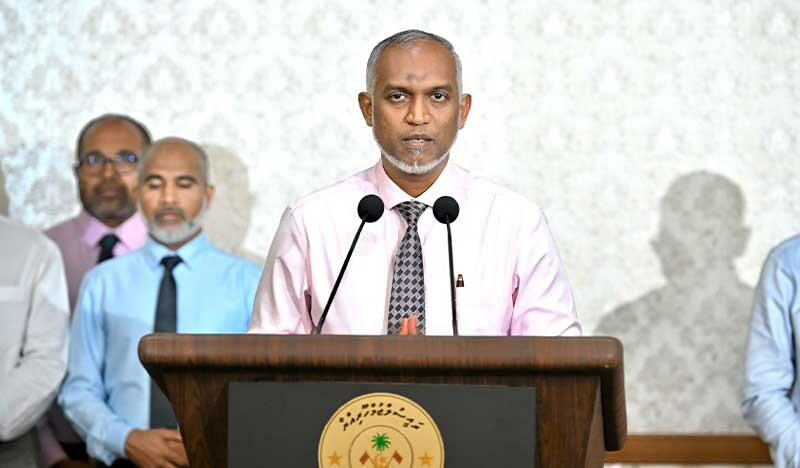Muizzu Asserts Media Independence Amid Controversial Media Reform Bill

President Dr Mohamed Muizzu has stated his commitment to a free and independent media, expressing his disapproval of any form of government influence over media operations.
This announcement came shortly after the Maldives government introduced a contentious new bill seeking to merge the Maldives Broadcasting Commission (MBC) and the Maldives Media Council (MMC) and impose fines on journalists of up to MVR 10,000.
ނޫސްތަކާއި މީޑިއާ ތައް ކޮންޓްރޯލް ކުރުމަކީ އަޅުގަނޑު ޤަބޫލުކުރާ ހަމަޔެއްނޫން. މާތް ވެގެންވާ އިސްލާމްދީނާއި ދިވެހިރާއްޖޭގެ ޤާނޫނު އަސާސީ އާއި ޚިލާފު ނުވާހާ ހިނދަކު ދިވެހި ދައުލަތުގެ ސިޔާދަތީ ބާރު ހިނގާ ސަރަޙައްދުގައި ކޮންމެ ދިވެއްސަކަށްވެސް އެމީހެއްގެ އަމިއްލަ މިނިވަންކަމާއެކު…— Dr Mohamed Muizzu (@MMuizzu) November 13, 2024
In a post on X, Muizzu affirmed that all Maldivians have the right to freedom of expression, provided it aligns with Islamic principles. The proposed legislation, introduced by Thulhaadhoo MP Abdulla Hannan Aboobakuru, who joined the ruling People’s National Congress (PNC) after being elected independently, is set to establish a new body, the Maldives Media and Broadcasting Commission. The commission would hold legal autonomy to undertake transactions, file lawsuits, and operate independently in its name.
The bill outlines plans to dissolve both the MBC and MMC, eliminating various posts, including those of their presidents, vice presidents, and members. The current staff members of the MBC and MMC would transition to roles within the new commission once the law is enacted. Additionally, it would repeal the Maldives Media Council Act and several articles of the existing Broadcasting Act, effectively dismantling the governance structures currently overseeing media operations.
MJA statement on proposed media bill:
Download link: https://t.co/RhQ3O6l11T pic.twitter.com/JB12BGx8XP— Maldives Journalists Association (@mjamaldives) November 13, 2024
The bill has sparked significant concern among local media and opposition groups. The Maldives Journalist Association (MJA) has warned that the proposed legislation could allow the government to exert undue influence over media outlets. Similarly, the Maldivian Democratic Party (MDP), the main opposition, has urged the government to withdraw the bill, arguing it could restrict press freedoms and impede journalists’ ability to hold the government accountable.
The MDP, in a public statement, described the bill as an attempt to curb press freedom, calling it a “shroud to bury press freedom in the Maldives.” The party voiced concern that the bill’s provisions, which allow for fines on media organisations and journalists, could obstruct freedom of expression and press autonomy, both of which are protected under the Maldivian Constitution.
MDP President Abdulla Shahid took to X, highlighting that the bill jeopardises hard-won freedoms. Shahid also accused the government of using the bill to conceal alleged incompetence and corruption, and he expressed fears of growing autocratic tendencies in the country.
Under the new legislation, the Maldives Media and Broadcasting Commission would be tasked with establishing ethical guidelines for media entities and journalists. Violations could lead to fines, licence suspensions, and mandated public apologies. Repeated breaches may result in fines ranging from MVR 5,000 to MVR 50,000 for media organisations, and from MVR 5,000 to MVR 10,000 for individual journalists.
ސަރުކާރުން ކޮންޓްރޯލް ކުރާ ކޮމިޝަނެއް އުފައްދައި މީޑިއާގެ މިނިވަންކަން ކަފުން ކުރުމަށް ހުށަހަޅާފައިވާ ބިލާ މެދު ކަންބޮޑުވުން ފާޅުކުރުންhttps://t.co/wEOPZGKIUY pic.twitter.com/UPSYoVBjLV— MDP Secretariat (@MDPSecretariat) November 13, 2024
The proposed changes also include guidelines for the media, with requirements aimed at safeguarding national security, supporting the government, and respecting individuals’ dignity and privacy. The bill’s introduction has intensified discussions on the delicate balance between media freedom and regulatory oversight in the Maldives.







